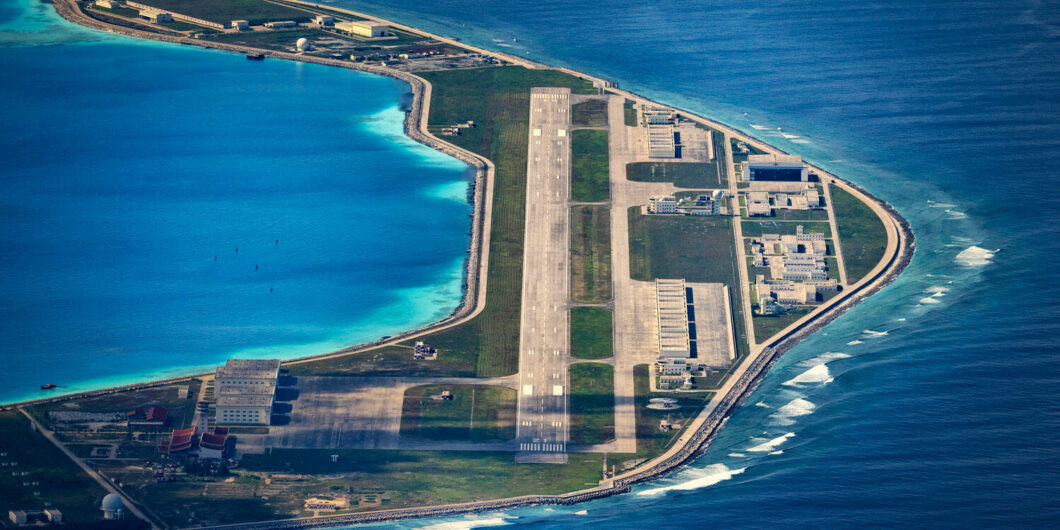A return to free trade will make America economically stronger and more influential on the world stage.
A Friendly China?
Give David Daokui Li credit for knowing his audience—and himself.
In his first full-length book written for a Western audience, Tsinghua University economics professor and director of the Academic Center for Chinese Economic Practice and Thinking (ACCEPT), Li makes the case that China is no threat to America. His aim: to lower tensions, cool heads, and reassure Americans who may be fearful of China’s growing military might, its territorial ambitions, and its ceaseless attempts to “hack” its way into America’s government, its corporations, and even its children’s minds.
(Yes, that was a TikTok reference).
Much like the United Federation of Planets Starship Discovery began its first Klingon encounter with the assurance, “We come in peace,” so too, does Li begin his tale of China’s World View.
Li’s version of this is simple: What China really wants is just to keep to itself.
As a literary ambassador come to plead China’s case, Li presents himself as an insider having special insight into how China’s economic intelligentsia think: “I am an insider. I live and work in the building.” As such, he’s well positioned to provide Western readers “a better understanding of China and its world view.”
Li approaches his task with disarming humility, apologizing in advance if his writing turns out to be “too rigid and dry” and demurring that he’s actually “ill-suited” to write for a general audience.
The good news is that he’s really quite good at it, and fully capable, over the course of 256 pages, of providing substantial insight into how the Middle Kingdom is run, to those who’ve never had the opportunity to live there.
What China Is
I number myself among such unfortunates. And despite all Li’s warnings that his style will be rigid and dry, I assure you there’s much in this book that will come as a surprise—and a revelation to anyone heretofore confused about just how the Chinese government works.
Take for example the curious way Chinese officials rise through the ranks. In the United States, you’re probably familiar with the usual path: A young man or woman leaves college and begins work as a humble campaign volunteer (or perhaps a “community organizer”), later wins a spot on the local school board, and then proceeds to climb the political ladder to mayor, state senator, US representative, US senator, and ultimately (deo volente), President. Apart from that final office, however, most of the ascension takes place within the geographic confines of a single state.
Not so in China.
In contrast to America’s more parochial system, Chinese apparatchiks tend to hop around quite a lot, geographically speaking. Citing one notable example, current PRC President Xi Jinping began his political career working for China’s Central Military Commission in Beijing, before moving 160 miles south to become deputy Communist party county secretary in Hebei province. Promoted one rank there, he later proceeded to serve in three other provinces, alternating vertical and lateral moves until landing the prestigious post of Shanghai party secretary.
From there, he boarded the express elevator, first to Vice President of the People’s Republic, and then to the top job: President.
To an American eye, it all seems rather helter-skelter, but in Li’s view, it may give rising leaders a more holistic view of the country and heighten loyalties to China as a whole. (And of course, loyalty to the Party apparatus that authorizes the transfers and promotions.)
This being a book on Communist China, a few words on “Communism” are probably in order—in particular, on how corporations operate in the Chinese state.
Li devotes a good two chapters to discussing business in China, and to be honest, this section of the book does tend towards the “rigid and dry” style that Li warned us about.
As Li describes it, all of China’s state-owned enterprises (SOEs) are divided into three parts (so to speak): Large monopolies such as PetroChina, China Mobile, and Bank of China, run by the central government; “competitive” enterprises, including many joint ventures in the car manufacturing sector, supervised by provincial governments; and investment funds (essentially state-owned hedge funds) set up at all levels.
Li argues that China has a cyclical view of history, and believes that if its territory contracts at times, it will inevitably expand again.
Li admits that most such SOEs have their roots in China’s Communist Revolution and the expropriation of private property that followed. Yet he argues that at all levels, China’s SOEs have already evolved into essentially capitalist businesses motivated primarily by profit. Curiously, he also argues that China is in the process of partially privatizing its SOEs, so that they will no longer be majority-owned by the state.
At this point, a reader might wonder: If the SOEs are already making money for the state, why fix something that isn’t broken, and give up state ownership of these profits? Furthermore, given the Chinese government’s clear ability to destroy at whim even private companies such as Ant Group, New Oriental Education, or Tencent, it’s not entirely clear what difference it will make for investors—aside from taking on more risk—if China does largely privatize its SOEs.
Disappointingly, Li does not satisfy the reader’s curiosity on either of these points. But if doing so might risk upsetting the narrative—that China is really just like any other open market economy—well, perhaps there’s a reason he doesn’t delve too much deeper.
What China Wants
All the above observations about China’s inner workings are revelatory to the heretofore casual outside observer. But questions remain: What is China’s World View? What are China’s broader ambitions on a global scale?
“Ill-suited” though he may claim to be to the task of writing, like any good author, Li saves the best bit for last. It’s only at the end of his book that he finally answers this question that has been weighing on his readers’ minds—but not without reason.
As it turns out, the very biggest takeaway that Li wants to impress upon readers is that “the rise of China is not a threat to the rest of the world.” But to make this point, he first needed 200 pages to explain the peculiarities of China’s government, its economy, and its citizenry.
Will China, like the Soviet Union or Communist Vietnam or North Korea, attempt to undermine neighboring democracies and set up communist rule there instead? No, says Li. As explained at length, Chinese peculiarities are in fact so peculiar that it’s quite inconceivable that China would try to export a “Chinese model” beyond China’s own borders.
Will China attempt to conquer foreign lands, and establish an empire? Again, no is the professor’s response. In contrast to Soviet Russia, Communist China has no desire to broaden its borders. Why make expansionist waves, after all, when China can simply project power over the main commerce waterways of the Pacific, from within the safety of its own borders? As Li explains, China prefers this Confucian approach—establishing a “tributary system” in which China is accorded the respect it (feels it) deserves, and in exchange, benignly declines to officially conquer anyone.
Well, perhaps with a few exceptions.
In a chapter on Chinese history, Li argues that China has a cyclical view of history, and believes that if its territory contracts at times, it will inevitably expand again. During the Opium War of 1840–42, for example, China lost large territories to Britain (Hong Kong), Germany (Qingdao), and Japan (Taiwan).
Two of those three territories, you may have noticed, are now back under Chinese control.
Now, this advice may not sound particularly reassuring if one happens to live in Taiwan. China also seems of the opinion that the entirety of the South China Sea also once laid within its demesnes, which explains its curious insistence on drawing a nine-dash line denoting Chinese waters hundreds of miles from the Chinese coast, and also China’s obsession with building artificial islands. Once disputes over these and a few other matters are put to bed, however, and China is rightfully acknowledged as regional hegemon in its geopolitical backyard, Li argues that “China will make efforts to facilitate peace with the United States and its allies.”
Admittedly, the prediction that China will have to “facilitate peace” with the US, et al, raises the natural question (which Li artfully dodges) of what state of affairs would logically precede such peace talks. That disturbing quibble aside, though, Li’s broader argument is that China seeks neither conflict nor confrontation nor expansion abroad. Rather, China is so intensely focused on managing its own affairs that it really can’t be bothered with most foreign affairs. China will be content if it can simply “gain and maintain international respect for China, the people, the Party and the government.”
Respect … and perhaps just the teensiest bit of tribute.



